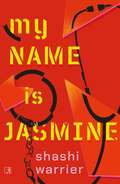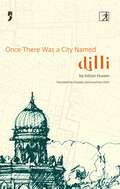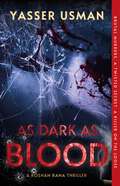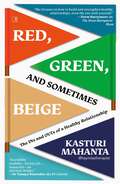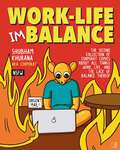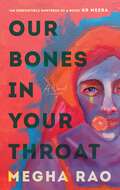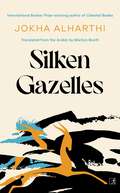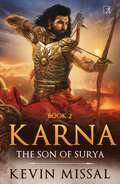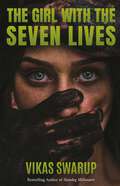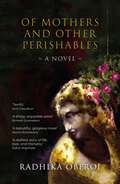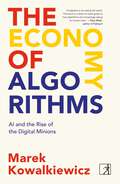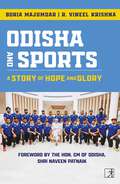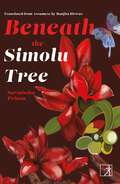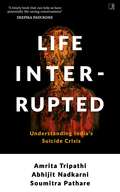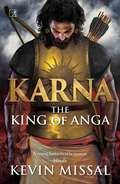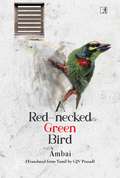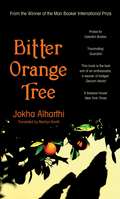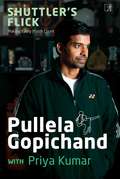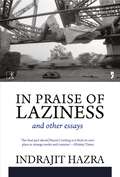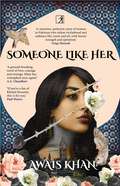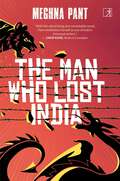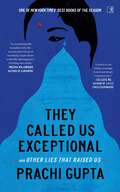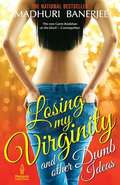- Table View
- List View
My Name Is Jasmine
by Shashi WarrierA woman wakes up confused in Malkangiri District Hospital in Odisha. When a nurse wants to know her name, she blacks out in terror at the realization that she has no idea who she is. The next time she wakes up, the terror returns, but she wills herself to look at her world more rationally. She discovers she&’s suffered a head injury and lost some of her memories in the aftermath. When the police come, she finds out that she knows more about guns and violence than any common citizen should. Floating voices in her head tell her: trust no one, keep to yourself, you&’ve been through worse and survived. When a psychiatrist is brought in to find out whether she&’s faking her amnesia, she's inclined to trust him. Her fingerprints lead the police to believe that she is part of a group that's planning a major operation soon. While the investigating agency fears that her former colleagues might try to have her killed before she can testify. Deciding that she needs legal help, the psychiatrist calls in a former Supreme Court advocate. Given the concern and support from the psychiatrist and the lawyer, Jasmine is torn: should she give up her group that supported her when she had nowhere else to go? Or these two people, who believe in her when no one else would? My Name is Jasmine is a riveting saga of betrayal and revenge, and the deep-rooted conflicts which continue to dismantle the very foundation of India.
Once There Was a City Named Dilli
by Intizar HussainThe history of Delhi has been told and retold many times. Often the intent is to use history as an ideological tool for staking a claim to the present of the city. In Intizar Husain&’s retelling, it is the tale itself that becomes delectable. A popular recital that highlights the forgotten nuances of the story, Once There was a City Named Dilli, is a celebration of the people and culture that made the city unforgettable. Forts, walled cities, bazaars, diwan khanas, durbars, and the Yamuna itself come alive in this ode to a capital serenaded and ravaged by powerful kings and chieftains over time.
As Dark as Blood: A Roshan Rana Mystery
by Mr. Yasser UsmanA MAN VANISHES WITHOUT A TRACE IN DARJEELING Tormented Delhi cop Roshan Rana is dragged into a high-stakes investigation in which he wants no part. Roshan&’s personal life is in ruins. Dementia is eroding his father&’s memory. The thought of being forgotten by his father, as his own son has done with him, cuts deep. As a chilling case unfolds in the serene but secretive hill town, Roshan&’s buried past comes back to haunt him. ONE BY ONE, THE BODIES BEGIN TO PILE UP What starts as a missing-person case soon spirals into a nightmare as Darjeeling becomes a hunting ground for a ruthless and cunning psychopath. With a wave of brutal murders, Roshan realizes the serial killer isn&’t just targetting individuals — he&’s dismantling a community, piece by piece, with a savage, calculated precision. CAN ROSHAN CONFRONT HIS OWN DEMONS AND STOP THE KILLER BEFORE IT&’S TOO LATE? Racing against time, Roshan pieces together a trail of horror that spans years and cities, uncovering a crime far more twisted than imaginable. As he closes in on the psychopath, the line between hunter and hunted begins to blur. Gripping, atmospheric, and emotionally charged, As Dark as Blood is much more than a sharp crime thriller. Layered with intrigue and psychological depth it leaves you breathless until the last page.
Red, Green, and Sometimes Beige: The Ins and Outs of a Healthy Relationship
by Kasturi MahantaOh, that&’s such red-flag behaviour. My love language is physical touch but hers is words of affirmation. But I have an anxious attachment style, I need frequent validation. Sound familiar? If you&’ve been on the internet, chances are you&’ve definitely heard of flags, trauma bonds, and attachment styles. But what do they even mean? Relationship Coach Kasturi Mahanta explains the common troubles plaguing our relationships from a therapist&’s perspective. Through fictionalised accounts of problems she has coached people through, she explains the hows and the whys behind people&’s behaviours, especially in romantic relationships—whether it be coping mechanisms, anger, or the invisible emotional labour a partner performs. Armed with exercises for readers to participate in, these chapters help us not only identify certain patterns and behaviours—in our partners and ourselves—but also delve into why they might occur. It aims to equip readers with a better understanding of the root causes of problems so that we may build and ultimately stay in healthy, long-term relationships
Work Life Imbalance
by Shubham KhuranaBecause the balance doesn't exist. Period. This is a collection of the comics I have posted over the years about work, life and the lack of balance thereof. While the first collection 'Monday to Friday' was centered around what the days have come to mean to us in our corporat lives, this one focuses on what fills those days- thankless tasks, endless mail chains, meaningless jargon, useless meetings. All those thing which make you go, "What's the point?" But, the objective of this book stays the same - to help you find solace in the fact that you're not alone in this pointless
Our Bones in Your Throat
by Megha RaoA wild myth.A lake amidst a forbidden forest.A siren song. When Esai arrives at St. Margaret&’s imposing campus, amidst which lie the mysterious woods, she plunges headfirst into a world of power games, underground recitals, new enemies, and complicated relationships. And then Esai is lured into the arms of something far more dangerous and exciting —a water spirit lurking in the foliage. She stumbles onto an ancient secret that threatens to dismantle the entire college to the bone. Esai knows something the others don&’t. She finds herself at the heart of the unrest brewing on campus, alongside Scheher. Scheher, once her only friend, now a formidable face of dissent. What happens when those you fought for once, turn against you? Within the halls and thickets of St. Margaret&’s, decisions must be made. Friends, foes, and lovers must learn to navigate the quiet truths of life, the fragility of friendships, and the aftermath of passion.
Silken Gazelles: A Novel
by Jokha AlharthiFrom International Booker Prize-winning author of Celestial Bodies and Bitter Orange Tree, a new novel about two Omani women whose unbreakable connection is forged as nursing sisters — a bond considered akin to that of a birth sibling. Raised as sisters, Ghazaala is devastated when her friend Asiya is forced to leave their small mountainside village. It is a separation that haunts her into adulthood, and she never gives up on finding a love that might replace the bond they shared. Years later, Ghazaala&’s family moves to Muscat, where she falls in love with a professional violinist who lives in their building. She surrenders herself completely to his charm and, despite her parents&’ opposition, runs away from home to marry him. While balancing the duties of a new wife — caring for her husband, their home, and, before long, their twin boys — Ghazaala resumes her education and enrolls in university. Ghazaala&’s sharp wit catches the attention of another student, Harir, during their freshman year. In the pages of her diary, Harir recounts the story of her deepening, transformative friendship with Ghazaala over the course of ten years. The elusive, ghostly existence of Asiya exerts a force over both their lives, yet neither Ghazaala nor Harir is aware of the connection. From the brilliant mind of Jokha Alharthi comes a tale of childhood friendship, and how its significance — and loss — can be recalibrated at different stages of life.
Karna: Son of Surya
by Kevin Missal20 years later… United by promise. Divided by hate. Karna, the King of Anga, is distraught after the recent demise of a closed one. And to achieve salvation, he seeks to hurt the ones who are closest to him. Satyasena, the firstborn son to Karna, holds no mantle to his popular father but he strives for it. To become better, he&’s ready to lose everything. Shanaya, the queen of Anga, takes care of the throne during her husband&’s absence, but recent moral duties have begun to confront her past and probably betray the present. Vrishaketu, the second -born to Karna, has been shifting loyalties between the Pandavas and the Kauravas, insidiously plotting the downfall of his father and the throne, but a new distraction ends up blurring the line between right and wrong. Once a loving family, it is now haunted by conspirators, murderers and stabbers. Will they survive? Little do they know, an ancient evil has risen, ready to poison the roots of our nation and threaten the existence of Karna.
The Girl with the Seven Lives
by Vikas SwarupTwenty-five-year-old Devi has been kidnapped. She is now being held hostage in a dimly-lit basement by a masked gunman who is threatening to shoot her dead unless she reveals her entire life story and confesses to all the crimes he is accusing her of. To add to her terror, he is putting her life up for an online auction, where the highest bidder will determine her fate. With her very existence hanging in the balance, Devi proceeds to give her captor &‘a confession to beat all confessions&’, while simultaneously engaging in a high-stakes battle of wits and endurance against impossible odds. Thus commences an enthralling odyssey through the heart and soul of modern India, as over the course of a single night, Devi unveils the secrets of her seven extraordinary lives. From the labyrinthine alleys of Delhi to the hallowed grounds of Punjab, from the serene landscapes of Kerala to the sun-drenched shores of Goa, and ultimately to the bustling streets of Mumbai, Devi&’s captivating journey is a rollercoaster ride through a tangled tapestry of hidden truths, deceit, and shocking revelations which will keep readers on the edge of their seats until the very last page. Devi is the ultimate survivor - a girl from the gutters who dares to rewrite her own destiny. But can she survive the longest night of her life? Vikas Swarup&’s long-awaited new novel is filled with the same evocative prose, immersive narrative and propulsive energy that made Slumdog Millionaire a global bestseller, and will resonate with readers looking for a thoughtful page-turner.
Of Mothers and Other Perishables
by Radhika OberoiOf Mothers and Other Perishables is an exquisite articulation of grief. It is also the sharp-eyed tale of a city tethered to violence and bursting with nazms. The morbidly funny voice of a dead woman echoes through the walls of her beloved storeroom, a compact space that contains her earthly belongings: cupboards full of silk sarees and baby clothes, albums of black-and-white photographs, a collection of vinyl records, a record player, old leather suitcases, an ebony-and-gold sewing machine. She reminisces about the past, and about the disease that causes her untimely death. Her storeroom becomes a quaint Bioscope of her life in Delhi as a young woman in the 1970s and 80s, decades that bring her romance, marriage, motherhood. The novel oscillates between the dead woman&’s yearnings and the immediacy and excitement of a parallel narrative — her daughter&’s. Nicknamed The Wailer (from the band Bob Marley and the Wailers), the dead woman&’s daughter offers a sardonic glimpse into the world of advertising — the night before a presentation, temperamental colleagues, the buzz of writers and art directors at work. But the peculiar dynamics of The Wailer&’s advertising firm alter drastically, when protests break out in the city of Delhi. Protesters swarm the streets, hollering against a new bill that persecutes the Muslim community. A Muslim art director is drawn to the pulsing heart of this movement. The Wailer, too, is inadvertently involved. Both narratives — the deceased mother&’s digressional memories, and The Wailer&’s palpable reality — also tell of Toon, The Wailer&’s younger sister, who is the CEO of a coffee startup. Their worlds converge to offer shards of the past, and navigate through a turbulent present. Personal and political histories collide in this haunting tale of many betrayals.
The Economy of Algorithms: AI and the Rise of the Digital Minions
by Marek Kowalkiewicz&‘A damn well-written book . . . a thrilling, entertaining whirlwind tour of different AI algorithms and their industry applications.&’ —Tobias Lange, Senior Vice President, Siemens Digital Industries Software Welcome to the economy of algorithms. It&’s here and it&’s growing. In the past few years, we have been flooded with examples of impressive technology. Algorithms have been around for hundreds of years, but they have only recently begun to &‘escape&’ our understanding. We are so impressed by what they can do that we give them a lot of agency. But because they are so hard to comprehend, this leads to all kinds of unintended consequences. In the twentieth century, we had the economy of corporations. In the first two decades of the twenty-first century, we saw the emergence of the economy of people, otherwise known as the digital economy, enabled by the internet. Now we&’re seeing a new economy take shape: the economy of algorithms. – How can we use algorithms to automate the boring parts of our jobs, enhance decision-making and drive innovation? – Where is the line between algorithmic &‘help&’ and surveillance? – Can an algorithm take your job? – How do you advertise to a fridge? – Do algorithms dream of electric sheep? – Why is it so hard to predict where technology will go next? These questions and more are answered by this exciting and ground-breaking book, which includes nine rules for flourishing in the new economy of algorithms.
Odisha and Sports: A Story of Hope and Glory
by Boria Majumdar Vineel Krishna RavellaFor decades, Odisha was considered as one of India&’s most backward states. But under the leadership of Naveen Patnaik, it has made huge strides in every sphere, from human-development indices and disaster management to becoming the role model for India&’s future sporting programme. This book, co-authored by Boria Majumdar, one of India&’s best known sports scholars and commentators, and Vineel Krishna, Secretary Sports for the Government of Odisha, is an attempt to make sense of that transformation, especially in the sporting space. It is a tale of what can happen when a wealth of untapped talent is harnessed by proper administration and planning, and the creation of state-of-the-art infrastructure. It is the story of how a state stepped in at the last minute to stage a major event, and how its success turned into a springboard for future endeavours. It documents the sea change that has been witnessed in the past half-decade, with the creation of world-class stadia, high-performance centres and hostels to house the most talented kids from the relatively under-developed regions of the state. It&’s also testament to the resilience and determination of the athletes, many of whom have overcome colossal odds to shine on the world stage. Most of all though, it&’s a story of hope – of what can happen when a government prioritises its people and recognises the power of sport to bring about lasting and positive social change.
Beneath the Simolu Tree
by Sarmistha PritamIn a village in rural Assam, quiet, unassuming Paridhi grows up witnessing domestic violence at close quarters. The conservative society she inhabits, shapes and befuddles her. Her rebellion is silent—she submerges herself in a world of colour. Pebbles turn into objects of art in her hands. She writes and reads extensively to escape her cloistered life. But to what end? Is it really ever possible to escape one&’s confines? The house she&’s lived in ever since her childhood, now infested with termites, is her responsibility now. With an ageing mother, an ailing uncle and an absentee brother, Paridhi feels like she has no one to depend on. Except perhaps Bondeep. But with passing time, there are growing concerns—will Bondeep&’s family ever be able to accept her? She could always confide in the vivacious Juroni, her best friend, neighbour and confidant. But Juroni has secrets of her own, which she keeps close to her heart until the inevitable, devastating end. Peopled with characters great and small, Beneath the Simolu Tree follows Paridhi as she navigates life, confronts injustices and comes out stronger but not embittered. Stories and realities are brought into sharp conflict in this tale of human yearning, as Pritam explores the depths of her innermost desires. At the heart of this novel lies the one question we spend our entire lives searching an answer for—what is it to love and be loved?
Life, Interrupted: Understanding India's Suicide Crisis
by Amrita Tripathi Dr Abhijit Nadkarni Dr Soumitra Pathare"A timely book that can help us have potentially life-saving conversations" - DEEPIKA PADUKONE, Actor & Founder, LiveLoveLaugh&“A shocking fact and huge wake-up call is that suicide is the leading cause of death for young Indians. As a country — across all our expertise and fields of interest — we need to pay closer attention, and this book urges us to do just that, with clear policy level suggestions and a call to action.&” -ABHINAV BINDRA In India we tend to have a fatalistic attitude towards suicide, tending to believe that nothing can be done to prevent it, focusing only on the politically volatile issue of farmer suicides, or periodically, when there is a death by suicide of a prominent personality or suicides in vulnerable groups (for example, students especially after Board exam results), there is a hue and cry in the popular press with opinion makers demanding immediate action.Why should you care? Because a disproportionate number of young Indians die by suicide and these are preventable deaths.The resulting knee-jerk reaction from policymakers is to offer some immediate solutions (appointing counsellors in colleges, etc.) which have little evidence of success. After a while, everyone forgets the issue, until the next such event and the cycle repeats itself.This book aims to present evidence-based strategies to tackle suicide, using interviews, case studies and conversations that lay readers can make sense of, while proposing an outline of steps that policymakers, journalists and key stakeholder groups can collaborate on to provide better solutions and save precious lives in India.
Karna: The King of Anga
by Kevin MissalIron Age of India… around 900 B.C.E.Born in the arms of the Ganga, Vasu grew up in the raging province of Anga. His life shaped by a fate that failed to be just—neglected by his own, stripped of his birthright—he was raised to be lost in an abyss of desires and disappointment.Cursed by his guru, hurt by the only woman he loved, ostracised from society for being the son of a suta. With his only armour—hope—he ventured on an unforgettable journey. Alone.This is Vasu&’s tale of survival, of endurance, of abiding courage in the face of all adversities. And eventually, of blossoming into the greatest warrior of all time… KARNA.In an ultimate battle against his archenemy—the insidious, dishonourable and all-powerful, Jarasandha, for a title he knew he deserved. From a sutaputr to a leader of the people, this is a saga of betrayal, lost love, and glory.This is the story of the King of Anga.
A Red-necked Green Bird
by AmbaiMyths and legends jostle with the contemporary in these stories where social issues of our times resonate with the inevitability of the past. The lyricism of Carnatic ragas permeate the pages of this quiet and powerful book in which love is rendered in all its immeasurable avatars—parental, carnal, platonic, romantic, divine. There is the woman who reinvents the notion of love in a unique way that amalgamates technology and spirituality through the internet; a man full of love who can sing Bulleh Shah and the woman who has lost her all in the 1984 anti-Sikh riots; the woman in the title story who stands by her deaf daughter but understands why her husband must leave the home they have built with love all these years; the man who finds out what it is to be a woman after a dip in the pond... These short stories are shorn of sentimentality but have a deep understanding of what it means to live, to love and to die. CS Lakshmi, writing under the pseudonym Ambai, has been a significant voice in Indian literature for the past four decades. A Red-necked Green Bird is the writer&’s seventh collection of short stories.
Age of Anxiety: How to Cope
by Amrita Tripathi Kamna Chhibber&‘What does it mean when someone says they have Anxiety?&’&‘I&’m stressed and nervous all the time, do I have Anxiety?&’&‘Will I ever get better?&’These are some of the questions we want to answer in this book. Is this the Age of Anxiety? Well, how could it not be – when so many millions of us feel that persistent combination of heart palpitations, impending doom, dread, even lack of control, as one of our contributors describes it. The question is, what can we do about it?Through this book we will learn how to distinguish between anxiety as 'an attack of the nerves' or something that will come and go, and Anxiety as a disorder, which will need treatment, including possibly therapy or medication. The conversations are even more pertinent given the global Covid-19 pandemic, prolonged periods of social isolation and an increased focus on mental health and wellness. We learn from coping with Anxiety Disorders, sharing their journey to healing, explaining exactly what would have helped them along the way, as they seek to bust common myths and misconceptions.
Bitter Orange Tree
by Jokha AlharthiZuhur, an Omani student at a British university, is caught between the past and the present. As she attempts to form friendships and assimilate in Britain, she can&’t help but ruminate on the relationships that have been central to her life. Most prominent is her strong emotional bond with Bint Amir, a woman she always thought of as her grandmother, who passed away just after Zuhur left the Arabian Peninsula. As the historical narrative of Bint Amir&’s challenged circumstances unfurls in captivating fragments, so too does Zuhur&’s isolated and unfulfilled present, one narrative segueing into another as time slips, and dreams mingle with memories.The eagerly awaited new novel by the winner of the Man Booker International Prize, Bitter Orange Tree is a profound exploration of social status, wealth, desire, and female agency. It presents a mosaic portrait of one young woman&’s attempt to understand the roots she has grown from, and to envisage an adulthood in which her own power and happiness might find the freedom necessary to bear fruit and flourish.
Shuttler's Flick: Making Every Match Count
by Pullela Gopichand Priya Kumar'But the return is not always easy, especially when the world has moved on without you, when the people who were rooting for you have now found other heroes to support.' When Pullela Gopichand had to undergo a risky arthroscopic surgery, chances of his full recovery were not great. His return to the badminton court seemed a far-fetched dream. The odds were stacked against him. Then, in 1998, he won the bronze in the Commonwealth Games. His biggest win was yet to come. In 2001, Pullela became the second Indian to win the All England Championship. This is the story we know. From not being able to walk to winning the most prestigious title in badminton, this is Pullela the player. But his success hasn&’t stopped at just him. The Pullela Gopichand Badminton Academy, set up in 2008, boasts of a host of World No. 1s including Saina Nehwal and Srikanth Kidambi and World Badminton Champion PV Sindhu. What is it about his teachings that propels players right to the top? In his official autobiography, we meet Pullela the coach. Through his own voice, as well as those of his students, mother, and wife, we get a look at the mind that revolutionised the game. We are shown not only what it takes to get to the top, but also, and more importantly, how to stay there. With the principles of his play laid bare, we are invited to apply them to our own everyday lives. In doing so, we ask questions, take accountability for our actions and perhaps find the answer to the greatest question of all—what does it take to become a champion?
In Praise of Laziness and Other Essays
by Indrjait HazraA cross between a collection of philosophical investigations and idle banter, In Praise of Laziness and Other Essays, is a celebration of what Milan Kundera defined as &‘Mystification: the active form of refusing to take the world seriously&’. From an Erasmian encomium to laziness, a literary forensic report on the adult years of Sukumar Ray&’s Pagla Dashu and Mark Twain&’s Huckleberry Finn, the joys of staying indoors, to the exquisite pleasures of an electric blanket—and with a science fiction story on colonisation bunged in—this book is the equivalent of a meandering river in which the reader dips his or her toes in, not knowing whether a dolphin will come by or a piranha take a snap. This is a book that&’s equal parts serious as well as frivolous, except you never quite know which parts are which.
Someone Like Her
by Awais KhanA young Pakistani woman is the victim of an unthinkable act of vengeance, when she defies convention for love, facing seemingly insurmountable challenges and danger as she attempts to rebuild her life. Multan, Pakistan. A conservative city where an unmarried woman over the age of twenty-five is considered a curse by her family. Ayesha is twenty-seven. Independent and happily single, she has evaded an arranged marriage because of her family's reduced circumstances. When she catches the eye of powerful, wealthy Raza, it seems like the answer to her parents' prayers. But Ayesha is in love with someone else, and when she refuses to give up on him, Raza resorts to unthinkable revenge… Ayesha travels to London to rebuild her life and there she meets Kamil, an emotionally damaged man who has demons of his own. They embark on a friendship that could mean salvation for both of them, but danger stalks Ayesha in London, too. With her life thrown into turmoil, she is forced to make a decision that could change her and everyone she loves forever.
The Man Who Lost India
by Meghna PantThe year is 2032. China declares war on India. Pillage and plunder ensues. The war comes to an abrupt halt when a supernatural event saves the obscure town of Lalbag from annihilation. Even as China renews its efforts to invade Lalbag, a greater calamity awaits this sleepy town. A Chinese cop stumbles upon a dangerous secret that threatens to end the town&’s immunity. A fierce and forbidden love between a servant and his mistress destroys two families. Meanwhile, the town&’s richest man becomes afflicted with a terrible disease, the town beauty goes mad when her love betrays, and a psychic turns water into blood, sending the town and its people deeper into tragedy. A dystopian never-been-done-before tale set in – and between – China and India, The Man Who Lost India is a powerful portrayal of love, strife and family in the wake of 21st century&’s biggest war. Incantatory and atmospheric, this is Meghna Pant&’s most ambitious novel yet, full of beauty, bloodshed and undeniable feminist power.
They Called Us Exceptional: And Other Lies That Raised Us
by Prachi GuptaAn Indian American daughter reveals how the dangerous model minority myth fractured her family in this "searingly honest memoir that manages to be at once a scalding indictment and a heartfelt love letter" (Scott Stossel, author of My Age of Anxiety). "In examining with boundless love the secrets and sorrows of one family, Gupta shows us the life-altering power of telling one's truth."--Megha Majumdar, author of A Burning How do we understand ourselves when the story about who we are supposed to be is stronger than our sense of self? What do we stand to gain--and lose--by taking control of our narrative? These questions propel Prachi Gupta's heartfelt memoir and can feel particularly fraught for immigrants and their children who live under immense pressure to belong in America. Prachi Gupta's family embodied the American Dream: a doctor father and a nurturing mother who raised two high-achieving children with one foot in the Indian American community, the other in Pennsylvania's white suburbia. But their belonging was predicated on a powerful myth: that Asian Americans have perfected the alchemy of middle-class life, raising tight-knit, ambitious families that are immune to hardship. Molding oneself to fit this perfect image often comes at a steep but hidden cost. In They Called Us Exceptional, Gupta articulates the dissonance, shame, and isolation of being upheld as an American success story while privately navigating traumas invisible to the outside world. Gupta addresses her mother throughout the book, weaving a deeply vulnerable personal narrative with history, postcolonial theory, and research on mental health, to show how she slowly made sense of her reality and freed herself emotionally and physically from the pervasive, reductive myth that had once defined her. But, tragically, the act that liberated Gupta was also the act that distanced her from those she loved most. By charting her family's slow unraveling and her determination to break the cycle, Gupta shows how traditional notions of success keep us disconnected from ourselves and one another--and passionately argues why we must orient ourselves toward compassion over belonging.
20,000 Leagues Under the Sea
by Jules VerneTwenty Thousand Leagues Under the Sea is a classic science fiction novel by French writer Jules Verne published in 1870.
Losing My Virginity and other dumb ideas
by Madhuri BanerjeeKaveri, the protagonist of the novel, is a 29-year-old, who is soon turning 30. She is a single woman who is in search of her true love that has eluded her thus far. She is an interpreter by profession and has mastered seven languages. She has read many books on men and how to land a date, yet she struggles to find a perfect partner. Her friend Aditi, who is quite experienced in terms of love and relationships, offers to help her by arranging dates for Kaveri. After a slew of unsuccessful dates, she does finally end up in a relationship, which is kind of ephemeral with the man, but true and eternal with her own self. The plot of the novel progressively moves from Kaveri being a lonely 30-year-old single woman, who is going through the roller coaster ride of a romantic relationship, to her discovering her own individuality.
